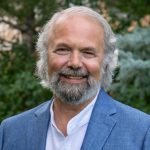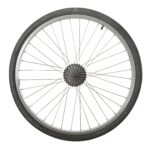
Have you noticed how the natural world, and even human technology, reflects back to us how we are made as human beings? And how we function?
Think of a bicycle wheel. It illustrates how diverse people with diverse experiences from diverse cultures, races, and backgrounds, and with very different ways of functioning in life, come together to do something spectacular.

At the center is a hub. It is attached to the rest of the bicycle. And through the chain, the hub on the rear wheel is connected to the source of power—you, if you are the rider.
The rest of the wheel is attached to the hub by spokes. The hub and the spokes are necessary for a functioning bicycle wheel but insufficient. Without the rim, the spokes would flop about. There would be no solid structure to the wheel. With the rim, you have multiple triangular patterns that create a stable architecture out of relatively light materials. Three points form the triangles—the relationship of the end of one spoke to the end of another through the rim, and the relationship each spoke has with the hub.
The tire on the outside of the rim is where the rubber meets the road.
A bicycle spoke represents our relationship to what is central in our life. It connects us with what has meaning and power. It connects to the hub of life, a connection we share in common with all other people.
If we picture ourselves at the end of the spoke, connected to the hub, without the rim, we are in a precarious position. From an engineering standpoint, there is nothing to hold us stable. We don’t achieve stability without a solid connection to the people near us in our life. That is what is represented by the rim. It is the connection of a spoke to the spokes on either side. And in making that connection, a spoke is connected to all other spokes. In the same way, when we reach out to the people near to us and establish a viable relationship with them, we are, at the same time, entering the circle of life that holds us all.
These same principles apply to us as an individual. There has to be a hub we know personally or there is nothing central around which our lives revolve. We are disconnected from the source of our power. All the facets of our life have to have a relationship to our central values, purpose, and our knowing of ourselves.
So, that is the individualized perspective. What would a transcendent view of this picture be like for a group of people? What is the holonic view which recognizes that the pattern of the whole collective lives in us and that our flourishing is tied to the flourishing of the whole? Seeing that leads us to care about all the dimensions of the wheel and the people who populate it. It brings us to the realization that we are our brother’s keeper; we are our sister’s keeper.
As within, so without. The principles that operate within us as an individual apply to any configuration of human beings anywhere, and to all human beings everywhere. We have to be connected to what is most central to us all and connected to each other to be functional. We have to know what we share in common and what makes us the same. What makes us different is obvious. But we must know what makes us the same to function as a collective.
The hub establishes our commonality. The hub is the basis of our oneness. Without it, there is no oneness. There is uniqueness. But we are separate without a hub and our connection to it.
We all have a huge stake in the flourishing of whatever collective we participate in, including the entire body of humanity. Today, it is easy to see how a global phenomenon like climate change or a nuclear disaster affects everyone. And those are only some of the more dramatic ways in which our fates are tied to each other around the world.
One implication of this is that we all have a stake in a healthy hub at the heart of a collective. A democracy embodies this in a practical way by voting for the head of state—the president or prime minister. We care about the quality of leadership at the hub, knowing it will affect everyone.
From the standpoint of any individual, the perspective of the wheel is likely to be from a sense of individual identity as someone at the end of an individual spoke. A person can wonder why they ended up being there. They can question the people creating a hub for the collective in whatever way, and they can question the other people around the rim.
The person thinks I’ll find people I like and avoid the people I don’t like. They don’t actively explore their relationship with people who are different from themselves. They don’t find their complementarity with the people around them. There is criticism instead of curiosity, exploration, reaching out, sharing, getting to know somebody, and then forming a bond as strong as the rim of that bicycle wheel.
And why would we do that? Usually, it’s left up to preference.
I like them. I don’t like them. They make me feel good. They tick me off.
It’s a matter of likes and dislikes, and it isn’t driven by the sense of purpose that comes from being connected to the hub. If we are deeply connected to the same hub, then there is a reason to connect to each other.
What I notice is that all too often it’s left up to the other person. They are not reaching out to me. And worse than that, they’ve offended me. They’ve done something I disapprove of. So not only are they not reaching out to me, but they’re doing things that I consider negative and, most importantly, negative for me.
You can see that kind of thing easily on the world scene. The situation in Israel and Gaza is full of it. They have a long history of offenses that go back and forth. I’m not asserting any kind of moral equivalency. My point is simply that this is an inability of two spokes to form a bond between them that could sustain the circle of life.
But it isn’t just Israel and Gaza. The same issues arise on a different scale where I live at Sunrise Ranch and all around the world. Everybody’s got a reason why they can’t form a bond with the person next to them. And if you talk to the people involved, it’s almost comical. They’ve got a reason, they’ve got a reason, and they’ve got a reason. Everybody’s got a reason. And meanwhile, the bicycle can’t move down the street. The spokes on the wheel are just flopping around, and there is no solid structure to humanity because the fundamental principles that stabilize the structure of human culture are not in place.
Just as surely as that bicycle wheel needs a hub, spokes, a rim, and tires, we need the equivalent of that among us in our lives as human beings to have a society that works, to have a community that works, to have a family that works, so that we are reaching out to another person—not because we like them and not because there is necessarily a personal affinity. We are reaching out irrespective of those things. We are curious about something that transcends all that. We are interested in the reality of that individual. We become intrigued by their connection to the hub. And we are drawn to explore the complementarity of our relationship.
So, I become curious about the person you know yourself to be. I am even more curious about the person you have yet to know yourself to be, but which is the deeper truth of who you are. I’m interested in getting to know that person. And I’m interested in sharing the deeper truth of me with you.
What does it look like to do this for real?
The spirit of forgiveness is an imperative. Just as for Israel and Gaza, if someone can’t forgive the history they have with other people, there is perpetual hell on earth. Or at least until there is total self-destruction. Whatever the history, for the people involved in any collective at whatever scale to thrive, they must be able to see what is transpiring not only from their own perspective but from a transcendent perspective that acknowledges how much is at stake for us all in what happens for us all.
This is a matter of principle. And these principles, reflected to us by a human invention from the 19th century—the bicycle wheel—operate in the life of every single person and every group of people on the planet. And they are either working to our advantage, creating prosperity and peace on earth, or we are flopping around like spokes without a rim. Or disconnected from the hub of what it is all about anyway.
This is true universally. Now, I’d like to focus on Emissaries of Divine Light and anyone anywhere who shares the mission to which we have devoted ourselves, bringing spiritual regeneration to humankind.
How do we do that? There are practical actions to take to fulfill our mission—offering trainings, publishing literature, giving talks, and operating communities, to name a few. But in the end, none of it means anything if we’re not a properly functioning bicycle wheel. If we don’t create a community of people united by a common cause, our practical efforts are in vain.
Yet if we find a common centering in what originally drew us to this community and this work, and build the bonds of friendship and co-creation between us, we create a portal to a higher power and a higher wisdom. We become the Wheel of Life. And we create a Stargate to the Source Reality that shines through this community to illuminate the world.
We become, in truth, Emissaries of Divine Light.

Yes!!! Through the Portal together!!
Yet if we find a common centering in what originally drew us to this community and this work, and build the bonds of friendship and co-creation between us, we create a portal to a higher power and a higher wisdom. We become the Wheel of Life. And we create a Stargate to the Source Reality that shines through this community to illuminate the world.
When Whidbey Institute located on Whidbey Island, was writing their constitution they included a vision for Global Unity.
Global Unity shows the result of the wheel of life functioning as it was meant to function. Thank you for your article
Now I know why when I lived and worked on Whidbey Island – I was always so peaceful!!!!
Thanks, David, for your masterful use of a bicycle wheel to illustrate these profound principles of how life works. I trust that my days of being a “loose spoke” are long gone, and that my firm connection to the hub and the rim will draw others to do the same.